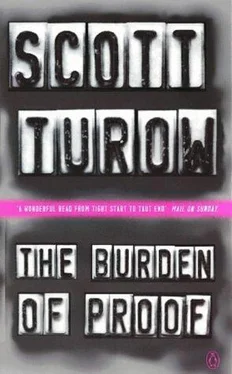Scott Turow - The Burden of Proof
Здесь есть возможность читать онлайн «Scott Turow - The Burden of Proof» весь текст электронной книги совершенно бесплатно (целиком полную версию без сокращений). В некоторых случаях можно слушать аудио, скачать через торрент в формате fb2 и присутствует краткое содержание. Жанр: Детектив, на английском языке. Описание произведения, (предисловие) а так же отзывы посетителей доступны на портале библиотеки ЛибКат.
- Название:The Burden of Proof
- Автор:
- Жанр:
- Год:неизвестен
- ISBN:нет данных
- Рейтинг книги:3 / 5. Голосов: 1
-
Избранное:Добавить в избранное
- Отзывы:
-
Ваша оценка:
- 60
- 1
- 2
- 3
- 4
- 5
The Burden of Proof: краткое содержание, описание и аннотация
Предлагаем к чтению аннотацию, описание, краткое содержание или предисловие (зависит от того, что написал сам автор книги «The Burden of Proof»). Если вы не нашли необходимую информацию о книге — напишите в комментариях, мы постараемся отыскать её.
The Burden of Proof — читать онлайн бесплатно полную книгу (весь текст) целиком
Ниже представлен текст книги, разбитый по страницам. Система сохранения места последней прочитанной страницы, позволяет с удобством читать онлайн бесплатно книгу «The Burden of Proof», без необходимости каждый раз заново искать на чём Вы остановились. Поставьте закладку, и сможете в любой момент перейти на страницу, на которой закончили чтение.
Интервал:
Закладка:
"Oh God." She put both hands on her cheeks in a childish way.
Stern waited to see who would speak. He had once again the sensation of something momentous. And then, through the mild night, he heard the pealing of his telephone, clearly audible to all of them as it carried from the open French door of the solarlure. Stern begged off without words; he threw up his hands futilely-Marcel Marceau could not have done better-and trotted a bit as he went toward the house, delighted, actually thrilled, to have escaped. But some intimation of the likely outcome of the scene he had left behind slowed his pace and eventually the thought came to form: Fiona would tell him. If She had not already.
Think of the advantage she'd gain. With her tale of refusal, she could lord a superior moral character, while still punishing Nate by hinting that she, too, was not beyond temptation. With his growing sense of the Cawley marriage-nasty, com-perifive, and pained-Stern knew Fiona could never keep this episode to herself. In the darkness of the house, he stood still while the phone went on ringing, and his spirit gathered blackly about a hard seed of apprehension and shame.
Oh, he.thought, this was preposterous. What had he to fear from Nate Cawley? What apology could Nate demand from Stern, of all people--Nate, who had $htupped his wife and stripped her fortune? He withered in anxiety at the prospect, nonetheless. He saw suddenly that he would look across whatever space he shared with Nate CawIcy and confront the very figure of all the failures in his own marriage. He was not sure he was ready for that, even now.
The machine had answered the phone. Through the light-less house Stern heard the amplified voice, made deliberately husky and sinister: "'I want your blood." It was Peter.
Stern picked up the extension.
"So you are there," his son said. They waited the usual agitated instant before either spoke again. "Well, are we going to do this or what?"
Stern, who had begun to think the test was unnecessary, found that he did not have the strength to argue.
"I am at your convenience."
"I've got my average exciting Friday night going, dictat'rag charts. You can come over right now, if you've got the time. Or are you seeing Helen?"
Peter liked Helen. On the few recent occasions when they had all been together, Peter seemed to have imposed some self-conscious restraint on his usual inappropriate or acerbic remarks. Stern explained that she was gone until Sunday and said he would come ahead now. Closing the sunroom door, he paused. The Cawleys were together in their yard, standing close, arguing. When Fiona's hand swept up in the direction of the Sterns' house, he jumped away from the door and waited, pressed against the wall, while he quietly lowered.the blind.
Perhaps it was the effect of Peter's joke on the phone, but there were few places as eerie as a darkened office building on a weekend evening.
Stern found both sets of plate-glass doors at the front still open, but inside, he was at once drilled to the core by the sensation of being alone; the large, darkened building hulked about him. The pharmacy on the first floor was black-grated and closed.
He rode the elevator up and, disembarking, found the long, tiled corridor lit in each direction only by a single fluorescent fixture, offering not much more illumination than a child's night-light.
What had Peter said? His average Friday night. As unpredictably as most of his feelings about his son, the stark sadness of this' declaration overcame him. The stylish admiring friends of Peter's college and high-school years seemed to have faded away. There was no one Stern knew of besides Kate who regularly shared Peter's company.
How did he spend his time? Stern had little idea. He had inherited his mother's tastes for music; he cycled; he worked. When he came to visit his parents, as he had done now and then while Clara was living, he liked to go running through the public forests in the Riverside neighborhood.
Afterwards, dripping with sweat, he would sit in the kitchen and read the newspaper aloud to his mother, making various caustic remarks about events. Clara served him soft drinks, puttered with-dinner. Stern witnessed these scenes largely as an outsider, struck by the very oddness of his son. Peter would be affronted to think he had his father's sympathy; his tightly wound personality also reflected a kind of strength. But approaching the office door, Stern felt the blackish wellspring of Peter's sarcasm, aloofness: his pain.
How, Stern thought to himself, how had it become this way?
He had in mind suddenly not merely Peter but the girls as well. Somehow these children had come into be'lng-enaerged with that strange agglomeration of talents and temperament he recognized as being essential to each. By three or four years of age, they had left behind the indefinitehess of infancy and were as fully formed as tulips on a stalk, ready to unfold. As a parent, he seemed so often to be no more than a spectator, applauding the expanding capacities, silently concerned by other developments. When Peter was six, his parents began to notice certain traits. Moodiness.
A quietude that seemed to border on despair. Peter, who now fashioned himself a renegade, had the unyielding character of a steel soldier. And in time his sisters manifested, each in her way, discontents of their own. Marta, outwardly engaging, was known to become lost-so much like someone elserain impenetrable sulky dreams. Katy, who Clara always privately insisted was the brightest of the three, remained sunny and affable, but almost clino ically indisposed to strive for any form of achievement.
Stern to this day found all this shocking. In his childhood, there had been such remarkable disorder born of his father's fragile condition, and the consistent watchful eye the entire family maintained on free-floating Argentine hostilities. But the home that Clara and he created was peaceful, prosperous-normal insofar as Stern understood the word. The children were cared for-and loved. Loved.
Oh, he may have had failings as a parent-at his best, he was undoubtedly too contained with the kids for American tastes-but even in his dimmest, most distracted state his love for his children was genuine, glinting like some fiery gemstone in his breast. And no person would ever be able to measure the bounds of Clara's dedication..Thus, as a younger man, it had stunned him to learn that every good fortune the world could offer wasn't enough: his children suffered, nevertheless.
Their difficulties became one more thing over the years to note about each and, with whatever halting efforts, to attempt to embrace. Geh Gezunderhayt, as his mother would have put it. Let them go in health, in peace.
Peter showed him inside with little ceremony. With the office closed, he was free to take his father into an examining room, a tiny tiled space with an antiseptic smell and a leather patient's table, test equipment, and instruments.
"Roll up ze sleeve, bitte," said Peter. Tonight it was accents. Stern complied, and his son precisely, instantly inserted the needle. "You okay?"
Stern nodded. "And you, Peter?"
His son, equivocally, opened his palm: Who knew, who could say. They spoke of Marta, expected in town any day. Stern asked about Kate.
"I thought you went to the ball game with her the other night, Looks great, doesn't she?"
"Actually, her looks concerned me," said Stern. "There is a difficult situation at hand. The circumstances are such that I must be somewhat removed, but I fear it is affecting her."
"I've heard about that," said Peter quiefiy. Stern had come with 'no intention of raising the matter of Tooley. What was done was done, and besides, it would be unprofessional for Stern to complain. Yet they proceeded into disagreement as if commanded by nature. It turned out that Iate in her concern for her husband had involved her brother. The thought that the situation had required her to turn to Peter rather than him wounded Stern unexpectedly:
Читать дальшеИнтервал:
Закладка:
Похожие книги на «The Burden of Proof»
Представляем Вашему вниманию похожие книги на «The Burden of Proof» списком для выбора. Мы отобрали схожую по названию и смыслу литературу в надежде предоставить читателям больше вариантов отыскать новые, интересные, ещё непрочитанные произведения.
Обсуждение, отзывы о книге «The Burden of Proof» и просто собственные мнения читателей. Оставьте ваши комментарии, напишите, что Вы думаете о произведении, его смысле или главных героях. Укажите что конкретно понравилось, а что нет, и почему Вы так считаете.












